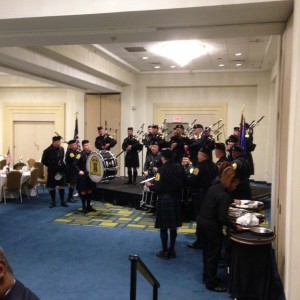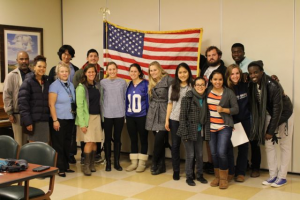Presiding over the Commencement ceremonies is one of my most moving and fulfilling duties. Each year I not only get to congratulate several hundred deserving Wesleyan students and their families, but I also get to soak in speeches from wonderfully interesting honorees. This was a year of many highlights, from Jim Dresser’s reminder of the deep traditions of excellence (and humor) on which we draw still today, to Majora Carter’s reminder that we must continue to struggle against long odds if we are devoted to change that matters. Joss Whedon had me in stitches when he told us gravely that our commonality was based on the fact that we were all going to die. His killer address brought home the importance of living with contradiction, with the energetic ambivalence that we should never try to smother.
I can’t reproduce the honorees remarks here, though soon we will have videos to share. Meanwhile, I humbly present some excerpts of my own remarks to the class of 2013.
During your four years here, Wesleyan has been largely isolated from many of the troubles of this world. While you have been students, the United States has been engaged in wars in Iraq and Afghanistan, and on this Memorial Day Weekend, I begin by asking us all to take a moment to remember that these wars have cost the lives of thousands of American soldiers and tens of thousands of civilians in those countries.
Economic times have been difficult as well. When you first arrived, in the fall of 2009, the global economy was reeling from the most massive disruption since the Great Depression. Unemployment in this country quickly skyrocketed and is only now slowly receding, while the distance between the very wealthy and the average American has increased enormously. 2009-2013 has been a good time to be in a bubble—even a pretty leaky bubble like our own here on campus.
You have spent four years taking advantage of an education that we believe is devoted to boldness, rigor, and practical idealism, and now as I speak to you for your last time as students here, I’d like to underscore three ideals that I hope you will take with you and make practical in your lives going forward: non-violence; diversity; and equality.
Campus culture is something that students, faculty, and staff create together, and for all the glories of the culture we’ve created here, it has not been immune to violence. Whether the subtle aggressions of institutionalized racism or the trauma of sexual assault, we have witnessed how violence disrupts lives—how it infects our heads and hearts. One of the tragedies of university campuses across this country is that, for all their purported liberalism, they often cater to a culture of privilege in which under-represented groups and women are subjected to forms of violence that preserve social hierarchies as they destroy individual lives. I trust we have learned at Wesleyan how important the aversion to violence is for education. The free inquiry at the core of learning certainly depends on vigorous discussion and debate; it depends on our willingness to take risks and to discover that even our deepest convictions may be mistaken. But learning also requires freedom from the senseless wounding of aggression.
In a land all too prone to pointless violence, I trust that in the future you will work to create non-violent communities that promote creative experimentation, and that you will reject cultural tendencies that subordinate patient inquiry to macho projections of force.
A second ideal I hope you will make practical in your lives after graduation is the value of diversity as anti-conformity. At Wesleyan our commitment to diversity is related to our belief that we have a better chance of developing powerful ideas and practices if we work through a multiplicity of perspectives. We know that homogeneity kills creativity and that diversity is a powerful hedge against the “rationalized conformity” of groupthink. Productively connecting things that had not previously been brought together is very much in the Wesleyan spirit. For example, think of your experience with Wescam these last few weeks… Of course, not all combinations will be productive—some creative experiments fail. But without divergent thinking we will be more likely to fall into patterns of enforced conformity that undermine our potential for the future.
You are beginning your post-collegiate years at a time when the phrase “potential for the future” points to something extremely fragile for many young people in this country. This brings me to the third ideal: equality. I trust you have experienced a spirit of egalitarianism here at Wesleyan—a spirit that celebrates great performance rather than great privilege. But while you have been in college, the privileged have become more and more powerful across this land. And this may well continue as entrenched elites forge better and better tools to protect their advantages. Access to a real education is the best antidote to the unnatural aristocracy of wealth. Education creates opportunity, allowing for the experience of freedom as one’s capacities are enhanced and brought into use. Access to education has never been more important, and that’s why I pledge to you today that as long as I am president, financial aid will remain my highest fundraising priority.
Wesleyan will remain a place where students from diverse backgrounds come to rely on themselves, their neighbors and teachers in a context of non-violent egalitarianism and community. Having made this education your own, I am confident that you will resist the trends of inequality that are tearing at the fabric of our country.
Non-violence, diversity and equality…these are ideals shared by generations of Wesleyan alumni. As I say each year, we Wesleyans have used our education to mold the course of culture ourselves lest the future be shaped by those for whom creativity and change, freedom and equality, diversity and tolerance, are much too threatening. Now we alumni are counting on you, class of 2013, to join us in helping to shape our culture, so that it will not be shaped by the forces of violence, conformity and elitism.
We are counting on you because we have already seen what you are capable of when you have the freedom and the tools, the mentors and the friendship, the insight and the affection to go beyond what others have defined as your limits. What you can do fills me with hope, fills me with confidence in the potential of education. I know that you will find new ways to build community, to experience the arts, to join personal authenticity with compassionate solidarity. When this happens, you will feel the power and promise of your education. And we, your Wesleyan family, we will be proud of how you keep your education alive by making it effective in the world.
My dear friends and colleagues, four years ago we met while unloading cars together here on Andrus field. Later that day, many of your family members sat teary-eyed in the chapel as we spoke about how they would be leaving you “on your own” at Wesleyan. It seems like such a short time ago. Now it’s you who are leaving, but do remember that no matter how “on your own” you feel yourselves to be, you will always be members of the Wesleyan family. Wherever your exciting pursuits take you, please come home to alma mater often to share your news, your memories and your dreams. Thank you and good luck!





![photo[8]](https://roth.blogs.wesleyan.edu/files/2014/01/photo8-300x224.jpg)
![photo[9]](https://roth.blogs.wesleyan.edu/files/2014/01/photo9-300x224.jpg)